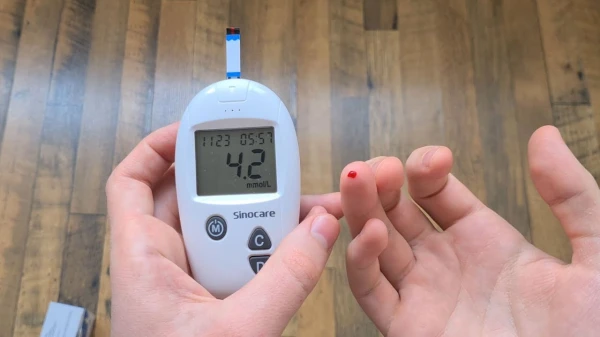
We found several non-obvious reasons to reduce excessive sugar consumption—this will provide additional motivation not to eat dessert and to replace snacks with healthier options.
Blood sugar control is increasingly discussed not only by doctors but also by preventive medicine specialists. The reason is that glucose affects not only the risk of diabetes but also how energy, skin, brain, and even sleep function.
Blood sugar levels fluctuate throughout the day, and this is normal. However, when glucose spikes too sharply after meals, the body responds with an equally sharp drop. These fluctuations are noticeable even in people without metabolic disorders: they affect well-being, concentration, mood, and eating behavior.
Glycemic stability is becoming an important part of health prevention and care—just like vitamins, sleep, or regular physical activity.
1. Energy Spikes
A sharp rise in sugar provides a brief surge of energy, but after an hour or so, it declines. Studies show that greater glucose variability is associated with impaired cognitive function (for example, reduced reaction speed and concentration).
Avoid large portions of simple carbohydrates in the first half of the day, especially after lunch. It is better to choose foods with a low glycemic index (vegetables, whole grains, protein). Light physical activity (15-20 minutes) after meals is also beneficial to stabilize glucose.
2. Premature Skin Aging
High blood sugar triggers glycation processes—when glucose interacts with skin proteins, they become less elastic and recover poorly. Research confirms that the accumulation of advanced glycation end products is linked to worsening skin condition: loss of elasticity, dull complexion, and early wrinkles.
Limit added sugars and simple carbohydrates. Incorporate more vegetables, berries, protein, and healthy fats into your diet—they support skin structure. Avoid late sweet snacks and sugary drinks, especially after 4-5 PM.
3. Increased Strain on Blood Vessels
Fluctuations in blood glucose after meals exacerbate inflammation and impair vascular function, even when overall sugar levels are normal. Scientific data shows that unstable glucose poses risks for cardiovascular disorders.
Include slow carbohydrates in your daytime and evening meals (for example, legumes, grains, vegetables) and protein. Do not eat fast carbohydrates as a separate meal—sweets, pastries. Maintain regular physical activity—30 minutes of exercise a day will help keep the vascular system functioning normally.
4. Unstable Appetite
A high spike followed by a sharp drop in sugar provokes a strong insulin surge—hence the constant feeling of hunger and cravings for sweets. Make your eating schedule regular (eat 3-4 times a day), and do not skip breakfast. Combine carbohydrates, proteins, and fiber on your plates (for example, buckwheat with vegetables and chicken). Plan snacks: instead of sweets, eat nuts or vegetables with hummus.
5. Mood Swings
When glucose levels change sharply, the brain reacts: neurotransmitter sensitivity decreases, leading to irritability, anxiety, and mood swings.
Eat consistently, avoiding sharp spikes in glucose. Healthy eating in the evening is especially important: make dinner light, avoid sweets, and establish a sleep routine (go to bed and wake up at the same time). Breathing practices or short walks are also beneficial to reduce load and stress levels.
6. Gradual Development of Insulin Resistance
It develops subtly: initially, glucose may be within normal limits, but cells are already responding poorly to insulin. This condition is associated with fat accumulation and reduced metabolic flexibility.
Regular physical activity will help again—aim for 150 minutes of moderate exercise per week. Monitor your weight and waist circumference. Slow carbohydrates are preferable in your diet; reduce the consumption of sugary drinks and processed foods.
7. Sleep Disorders
Sugar spikes in the evening can worsen sleep quality: less time in slow-wave sleep and more nighttime awakenings.
Have dinner no later than two to three hours before bedtime, avoid sweets and caffeinated drinks in the evening. Maintain a regular sleep schedule, create darkness and a calm environment in the bedroom, and ventilate the room. If there are persistent problems with falling asleep, pay attention to your daytime nutrition and evening habits.















Leave a comment